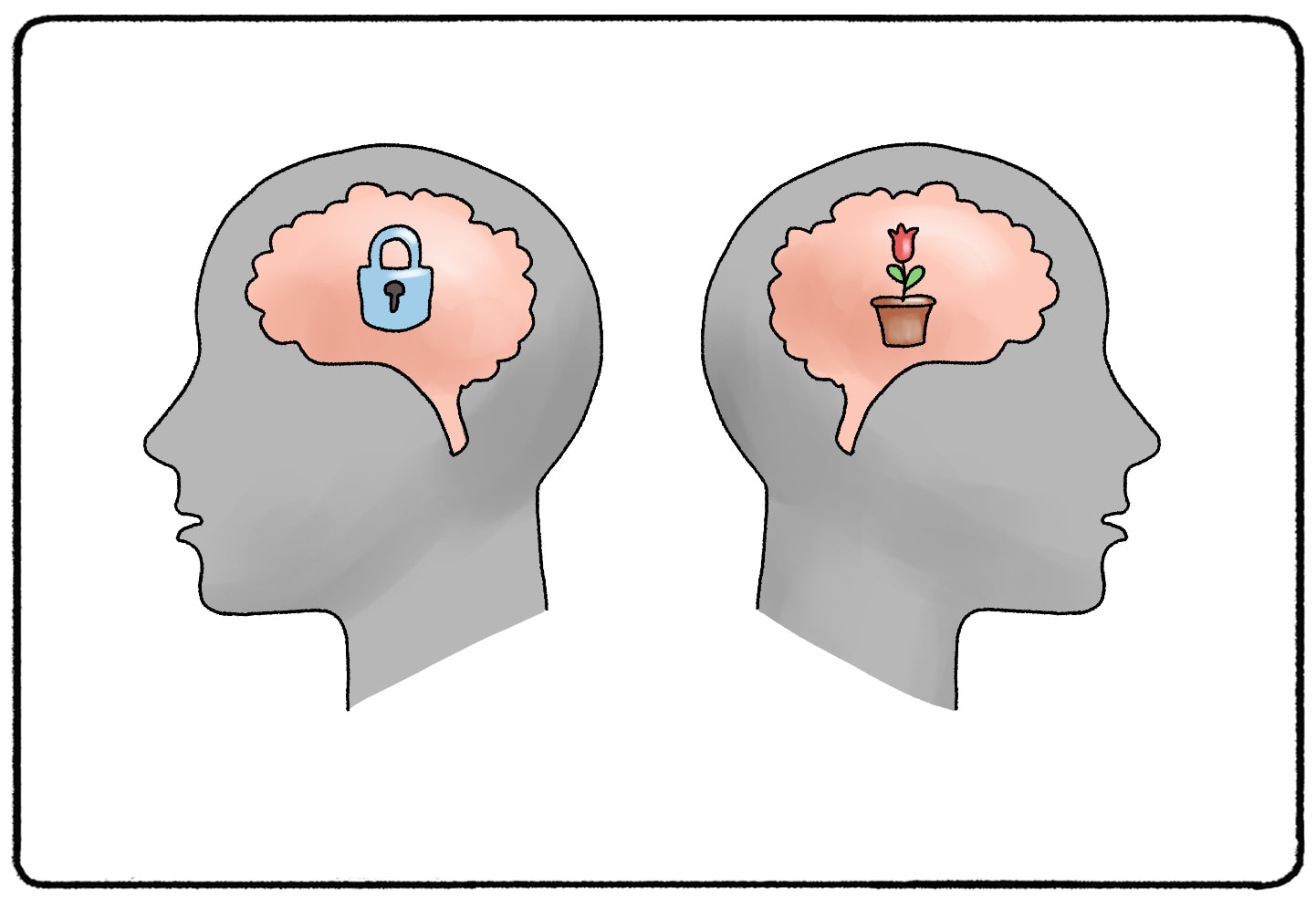A mindset is essentially a set of beliefs you carry with you that determine how you view and interact with the world. Depending on what kind of
you have, both conscious and subconscious, you might be more optimistic or pessimistic, high-strung or laid back, a leader or a follower. These kinds of mindsets can have a powerful influence in your life.
What Is a Fixed vs. Growth Mindset?
Stanford psychologist Carol Dweck has identified two types of mindsets that shape our beliefs about our abilities: fixed or growth. A fixed mindset believes in fixed personality traits and abilities and a growth mindset believes in the potential for substantial personal growth.

Fixed Mindset Examples
Dweck believes that individuals with a fixed mindset believe that they are what they are. They see their intelligence, athleticism, and creative ability as being fixed and don’t think they can be changed in any meaningful way. They believe there to be a sort of standard against which their, and everyone else’s, abilities are measured and that success is an affirmation that their traits are at a satisfactory level.
Growth Mindset Examples
On the other hand, those with a growth mindset believe that abilities can be developed through hard work. They recognize that people may naturally have certain talents but that anyone can learn and grow in any area. That’s not to say that they believe anyone could be an Olympic athlete or a world-class painter; but they do feel that anyone who can dedicate themselves to improvement can strengthen and develop their abilities significantly.
How Do We Develop Our Mindsets?
Which mindset you fall into isn’t a matter of random chance; the development of it starts in childhood and is dependent on the environment you’re in. Oftentimes when adults in a child’s life, like their parents or teachers, give them praise for their natural abilities, it leads to the formation of a fixed mindset. This would include something like congratulating the child on their success due to their innate intelligence. They grow into a mindset that believes everyone has innate abilities and that they are, more or less, set in stone. They recognize that they’re smart, but will consider their weaker skills to be unchangeable.
Children develop a growth mindset when their parents or teachers praise them for their effort. In this case, instead of telling the child that they did well because they’re smart, they congratulate the child for the hard work they put in. This gives the child the message that their success is based in how much they studied or practiced. They develop a mindset that tells them they can achieve their goals and grow their abilities if they work for what they want.
Effects of Fixed vs. Growth Mindset
The mindset you develop becomes significant in your life, affecting you in many areas. One of the most significant is the way you view yourself. As mentioned, people with a fixed mindset believe that their abilities are fixed; this means they feel they have to accept that they are the way they are and they can’t get better or change. This leads them to feel insecure because they feel inferior to others but believe they can’t improve themselves. They wind up focused on avoiding failure at all costs to try and preserve their feeling of success. They avoid trying new things because if they don’t think they’ll be good at it, they believe they’ll never be good at it and don’t want to be seen as a failure. It’s very limiting and frustrating.

Growth Mindset Effects
Individuals with a growth mindset tend to see themselves as having the potential to do well in all kinds of things. They don’t see themselves as limited by the abilities they currently have, but believe they can learn to do whatever they choose to so long as they’re willing to learn and practice. They’re willing to try new things because they know their success is dependent on their effort, not innate ability. They’re not focused on avoiding failure because they trust that if they do poorly in something, they can improve and succeed in time. Good self-esteem and confidence often come with the growth mindset.

Social Effects of Fixed vs. Growth Mindset
Your mindset also affects your relationships with others. Those with a fixed mindset, who feel insecure in their abilities, expect that their romantic partners will make them feel good about themselves. They want a mate who praises them for what they’re good at, someone to instill in them the confidence they haven’t been able to create for themselves. But this is problematic; what happens if the relationship ends? The feeling of confidence their partner gave them fades.
Individuals with a growth mindset have confidence in themselves on their own so they don’t need a partner to provide that for them. They appreciate a partner who challenges them and encourages them to explore new things. People with a fixed mindset also expect their relationship to be perfect from the get-go; disagreements seem like unfixable problems and can ultimately ruin a relationship prematurely. People with a growth mindset, though, recognize the imperfections in themselves and their partner but believe in the possibility of working though problems together. They know when a problem is big enough to end a relationship and when it’s something minor that will just take some compromise.
Sucess and Mindset
Because of how people with a fixed mindset view their abilities, they can be held back when it comes to success. Though they’re desperate for approval, they’re also unlikely to push beyond their perceived capabilities to reach the success they’re after. These individuals will listen to feedback on their existing abilities but will ignore information about how they can learn to improve their skills. They get stuck because they’re so afraid of failure that they’re unwilling to try to develop.
But with a growth mindset, people are eager to find out how they can get better and will then work to improve themselves. As their abilities grow, so do their opportunities. They can identify where they need to change to achieve what they want and are then open to working on honing their skills. It ultimately makes them more likely to find success than those with a fixed mindset, whether it be in business, arts, athletics, or academics.
It’s easy to see, then, how your mindset can affect your overall happiness and satisfaction with life. A fixed mindset makes you feel limited to what you already have, and makes you feel dependent on others to make you feel good. It holds you back from success because you’re afraid of failure. A growth mindset allows you to believe in the potential for improvement and makes relationships feel a bit easier and success seem within reach. The growth mindset seems more likely to create happiness. So what can you do if you’ve got a fixed mindset?
How to Change a Fixed Mindset
Luckily, a fixed mindset isn’t itself fixed. Pay attention to how you think and choose to change your thoughts. At first it will feel awkward and you probably won’t believe the thoughts you choose, but you’ll slowly start to believe in the things you tell yourself and will eventually see from the perspective of a growth mindset more naturally.
Start by accepting that you are not perfect, but remind yourself that you can improve. You can be more athletic or knowledgeable. You can be a better cook or a better artist. Then push yourself to try, even if you’re still afraid you’ll fail. Change your perspective on failure and criticism, because they don’t really mean anything about your future or your worth; if you feel you’ve failed at something, see it simply as room for growth. That’s not a negative thing, just an acknowledgment that you can get better. And tell yourself that if you stick with it, you will get better.
But don’t get lost focusing on the end result, because that can leave you prone to feeling like you’ve failed if that’s something you’ve feared for a long time. Instead, focus on the process. Goals are good to have but can be destructive if you place too much value on them and too little on the road toward them. Enjoy the experience of learning and of just taking part in something you’re interested in.
Breaking Free From Old Patterns
While you’re in the midst of the journey and are feeling discouraged, you might fall back into old thought patterns and start telling yourself that you’re “just not good at this.” If that happens, take a minute to correct your thinking. It can be done by simply adding the word “yet” to the end: “I’m just not good at this yet.” It’s a small change that can make the difference between you admitting defeat and you deciding to push forward despite facing a challenge.
Your mindset is powerful; it affects your life on many levels. In a fixed mindset, you’re likely to find yourself feeling limited, and in a growth mindset, you’re open to possibilities. But you have the power to choose which you want to live with. If you’re unsatisfied with how you feel about yourself and your life and think you’d benefit from a change, you can change your mindset to one that believes in growth and put yourself in a better position to thrive.
Learn More About Fixed vs. Growth Mindsets
Since Dweck started her work on fixed vs. growth mindsets, many psychologists have weighed in on the topic. Check out this TED Talk and Reddit thread on the subject. Not everyone agrees that these mindsets are completely separate or helpful!



